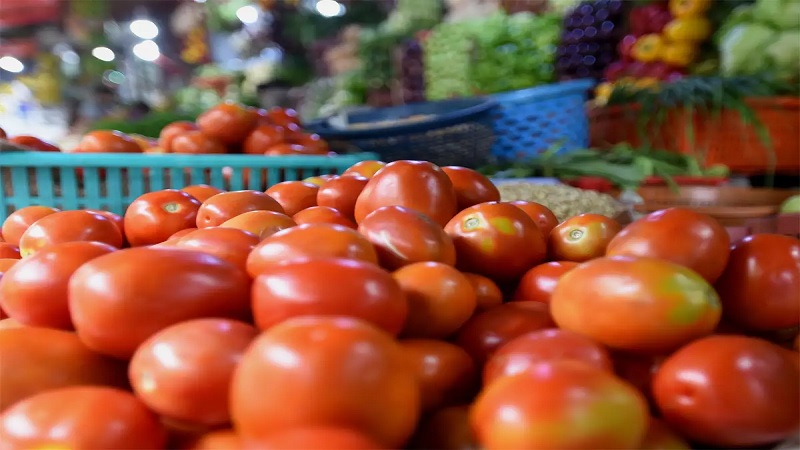
Image Courtesy:economictimes.indiatimes.com
Delhi’s Food & Civil Supplies Minister Imran Hussain has ordered a “crackdown against Tomatoes hoarders”. Nope, that is not an error, the fruit/ vegetable, much loved by cooks and consumers has not become the new onion, as in the centre of the political discourse around rising vegetable prices this season. It is said to be retailing at around or over Rs 150 for a kilogram in some parts of the country and in Delhi is selling around Rs 100.
Hussain has also directed the Food and Civil Supplies Department to send a daily inspection report after a meeting was held yesterday after the “sudden and undue increase in the retail prices of tomato in the markets of Delhi,” and was attended by the Delhi’s Commissioner, Food and Civil Supplies (CFS), Joint Commissioner and senior officers of the intelligence team of Food and Civil Supplies Department. It also reviewed the “price trend of onion, potato and other essential commodities”. The minister directed that “intelligence teams should also gather information about instances of hoarding and/ or black marketing of tomatoes, if any, so that the concerned departments could initiate necessary action against them under the Essential Commodity Act.”
According to a report in India Today, this “price rise has been greater in southern states, where vegetable prices have gone up by an average of 40 per cent.” This reason is reportedly “extensive crop damage caused by the recent rains.” Tomato and other vegetable prices are soaring in Andhra Pradesh, Madhya Pradesh, Maharashtra, Tamil Nadu, even Uttar Pradesh in the North.
The other reason is the surge in fuel prices. According to a report in Livemint, the rise in fuel costs “directly impacts the price of vegetables and prices of vegetables, especially tomato and okra, have witnessed a sharp rise in the past one month in the wholesale and retail markets here.” Adil Ahmad Khan, chairman of the Agricultural Produce Marketing Committee (APMC) of Azadpur Mandi, told the media, “The price of almost all green vegetables is more than what it was in the previous month. Tomato that was selling for Rs 33.5 per kg last month is now selling at ₹44.25, while the price of okra has increased to Rs 35 per kg from Rs 15 last month.”
Tomato, the new yardstick was retailing at nearly Rs 160 per kilo in Chennai, followed by Rs 130 per kilo in parts of Andhra Pradesh and in the range of Rs 90-120 in Karnataka. In Maharashtra, including Mumbai, the price of tomato has jumped sharply to Rs 100 per kilo, stated news reports.
On Wednesday, petrol in Delhi cost Rs 103.97 per litre, and diesel cost Rs 86.67 per litre. The report quoted retail prices “between Rs 90 to Rs 108, and Rs100 to Rs 120 for one kg of tomato and okra, respectively.” According to SP Gupta, former APMC chairman of Ghazipur Mandi, the skyrocketing vegetable prices may only ease with the arrival of new crops in the market. “There was little to no supply from neighbouring cities like Haryana and Uttar Pradesh.The tomato that we are getting is coming from as far as Shivpruri in Madhya Pradesh or Shimla. In fact, our supply from Bangalore is also not coming through,” he was quoted in the news report.
According to India today, data from the Department of Consumer Affairs suggests that “the all-India average monthly price of potato is at a 10-month high and onion price is at a nine-month high.” It warns that the price of staple vegetables like tomato, onions and potatoes will increase further due to elevated diesel prices.
The petrol prices per litre breached the century mark per litre across many metros in August. It was not the fuel price alone that is burning a hole in the pockets of common citizens. In the past year and a half, prices of several essential items have shot up drastically. Grocery store owners said their hands were tied because they were having to buy stuff from wholesalers and distributors at a much higher rate than before, suggesting hoarding. Added to this, the slowing down of the economy, unemployment, job cuts, salary cuts & the Covid-19 pandemic all make it a bitter pill to swallow for the citizen.
Meanwhile, in Tamil Nadu, the State Cooperative Department has announced that it will procure vegetables and sell them in cooperative stores at an affordable price. Cooperative Minister I Periyasamy told the media that in these stores, “tomatoes will be sold at Rs 85-100 per kg, compared to Rs 110-130 in the open market”. The subsidised vegetables will be sold in Chennai, Coimbatore, Madurai, Tiruchy, Salem, and Vellore, among other districts.
Related:
Rising fuel prices: Gov’t tries to obfuscate the truth… again!
India’s dairy farmers face another harsh summer – but not because of the heat